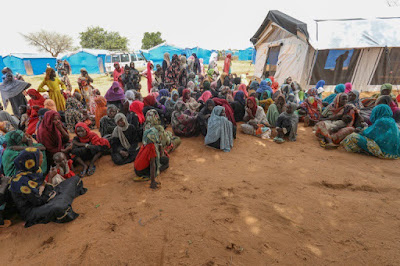- World leaders meet tomorrow (18 Sep) at the United Nations in a bid to salvage ambitious promises to lift the planet's poorest.
- But the development summit, on the eve of the annual UN General Assembly that opens Tuesday, threatens to be eclipsed by growing geopolitical tensions -- which will be symbolized by the presence at the meeting in New York of Ukrainian President Volodymyr Zelensky.
- In 2015, UN member states adopted the Sustainable Development Goals, 17 targets to transform the world by 2030 including by completely ending extreme poverty and making sure not a single of the planet's eight billion people goes hungry.
- UN Secretary-General Antonio Guterres said the summit will seek a "global rescue plan" on the targets, as he acknowledged that only about 15 percent were on track to be met and that metrics on some were heading in reverse.
Published by The Barron's Daily
Written by Amélie BOTTOLLIER-DEPOIS
Dated Sunday 17 September 2023 - here is a full copy:
UN Meet Looks To Salvage Promises On Helping World's Poorest
Image: Women who fled the war in Sudan await the distribution of international aid rations at the Ourang refugee camp, near Adre town in eastern Chad on August 15, 2023 (Photo credit: Mohaned BELAL)
World leaders meet Monday at the United Nations in a bid to salvage ambitious promises to lift the planet's poorest, at a time when vulnerable nations are facing a volley of crises.
But the development summit, on the eve of the annual UN General Assembly that opens Tuesday, threatens to be eclipsed by growing geopolitical tensions -- which will be symbolized by the presence at the meeting in New York of Ukrainian President Volodymyr Zelensky.
In 2015, UN member states adopted the Sustainable Development Goals, 17 targets to transform the world by 2030 including by completely ending extreme poverty and making sure not a single of the planet's eight billion people goes hungry.
UN Secretary-General Antonio Guterres said the summit will seek a "global rescue plan" on the targets, as he acknowledged that only about 15 percent were on track to be met and that metrics on some were heading in reverse.
The goals are "about the hopes, dreams, rights and expectations of people and the health of our natural environment," Guterres said.
"They're about righting historic wrongs, healing global divisions and putting our world on a path to lasting peace," he said.
Efforts to devote money and attention to the goals have been repeatedly set back, including by the Covid-19 pandemic, the war in Ukraine and other tumult, worsening climate catastrophes and sharp increases in the cost of living.
Image: A light display created using drones is performed before the city skyline and United Nations headquarters as part of a campaign to raise awareness about the Amazon rainforest and the global climate crisis ahead of the 78th United Nations General Assembly (Photo credit: Ed JONES)
The United Nations summit "is a vital space to make change," said Abby Maxman, the president of anti-poverty activist charity Oxfam America.
"Leaders must be held accountable, heed the calls of those on the front lines and use this time to listen, make meaningful commitments and follow up with real action," she said.
She said that one powerful step would be for wealthy nations to back reforms of international economic institutions to address the crushing debts impacting parts of the developing world.
A Group of 20 summit in New Delhi this month took initial steps to address representation in the International Monetary Fund and World Bank.
"But overall, will this SDG summit reignite a sense of 'hope, optimism and enthusiasm,' as it's been billed?" asked Noam Unger, a development expert at the Center for Strategic and International Studies in Washington.
"Rising authoritarianism, democratic backsliding, but also geostrategic competition and economic distress, those are likely to overshadow other fundamental issues related to climate change and global development," he said.
Developing countries' leaders will be present in force on Monday. The United States, which has pumped $43 billion in military aid into Ukraine to help defend against Russian invasion, has hoped to show it is also interested in development.
Image: People rally to end fossil fuels ahead of the 78th United Nations General Assembly and Climate Ambition Summit in New York on September 17, 2023 (Photo credit: LEONARDO MUNOZ)
"The world's most vulnerable are looking to us, like the young woman I met in Chad (in September), who fled unthinkable -- unthinkable -- violence in Sudan and had to leave her family and her education behind," said Linda Thomas-Greenfield, the US ambassador to the United Nations.
"This young woman is counting on us. She's counting on the world in her time of need," she said.
But a senior European diplomat warned the gap was growing between the developing and developed worlds.
One goal for the summit is "making sure that that rift doesn't grow further," the diplomat said.
This story was produced by AFP. For more information go to AFP.com. © Agence France-Presse
Source: https://www.barrons.com/news/un-meet-looks-to-salvage-promises-on-helping-world-s-poorest-b32a31d4
[Ends]


.jpeg)
.jpeg)


